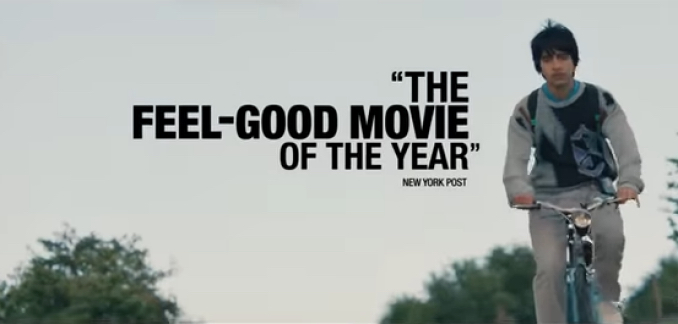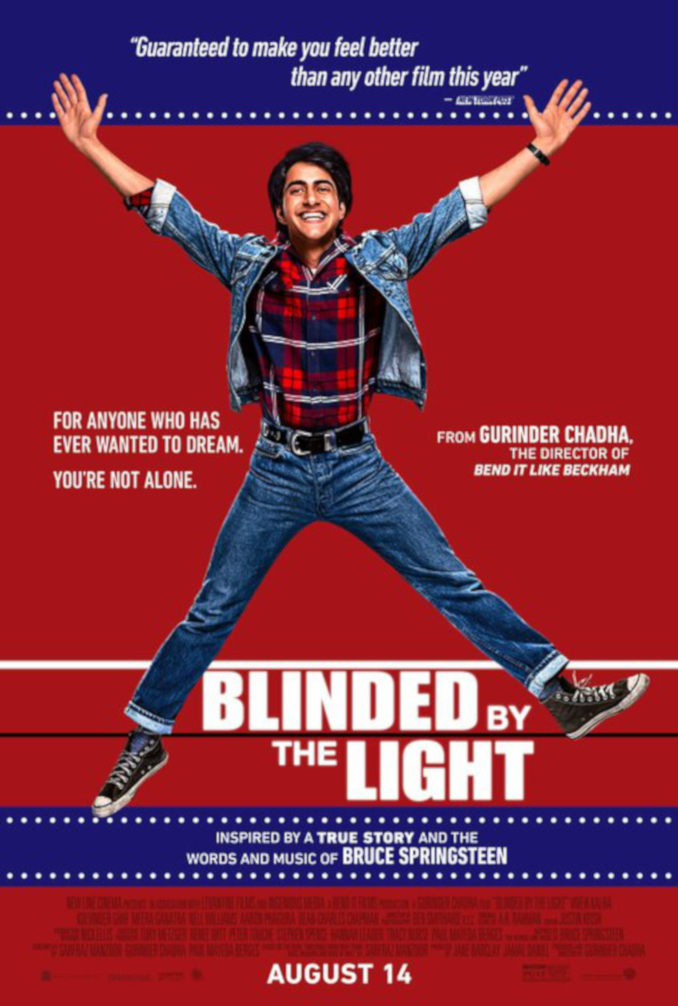

“Everybody’s got a hunger, a hunger they can’t resist;
There’s so much that you want, you deserve much more than this.“
Bruce Springsteen “Prove It All Night”
By Nina Heyn- Your Culture Scout
It is not easy to make a good movie about either racial problems or relations with parents. Either they reek of political correctness or they feel inauthentic. A new British movie Blinded By the Light tackles both issues in the way that avoids many of those pitfalls.
Director Gurinder Chadha has been hailed by critics as a keen observer of human nature, especially in this new sub-genre of stories about second or third generation immigrant youth who break away from their family traditions. In fact, she is one of the creators of the genre with her seminal comedy Bend It Like Beckham about a girl from a traditional Sikh family in England playing soccer despite her parental disapproval. That movie launched Keira Knightley’s career (her next big movie was the first Pirates of the Caribbean) and it became a part of whole slew of “immigrant clash of cultures” films such as My Big Fat Greek Wedding, The Hundred Foot Journey, and The Big Sick.
There is an old truth in filmmaking that if the script is bad, not much can be improved in filming but if the script is good, the movie has a fighting chance. Blinded by the Light had an excellent script and the filmmaking improved it further.
Javed is a Pakistani teenager living in the 1980’s in a small city of Luton. We see this city in the midst of the Thatcher era unemployment and a slide of the middle class into poverty. This is years before the Luton airport was transformed into a major gateway to modern London but the racial and economic tensions of today are even more visible in this period story. The kid dreams of becoming a writer – something that does not even register as an occupation for his traditional family whose dream is to arrange successfully the marriages of two young women in his family, and to have Javed become an accountant. The family struggles: father loses his factory job, mother feeds the family by sewing dresses all night, and an upcoming traditional wedding will put a dent on family finances even more. As much as Javed tries to be a dutiful Pakistani son, he is well on the way to a rebellion. He is enrolled in college prep classes but he is not really studying finance – he is in a creative writing class. He does not give all his earnings to his parents – he spends some on Bruce Springsteen’s records because he’s just discovered a God of Music and Poetry and his name is The Boss.
All this does not bode well for Javed’s relationship with his father, especially in a town when racial clashes and economic woes have sharpened the divide between an Asian community and the locals. Eventually Javed’s love of Springsteen music and poetry brings about a choice he has to make – his life or his father’s vision of what Javed’s life should be.
Buoyed by Springsteen’s greatest hits like Thunder Road, Hungry Heart or No Surrender, the story moves on to portray dilemmas of both the youth in general and the immigrant ones in particular. Javed has to grow up and realize that for him to be happy he has to make room for both his literary dreams and his traditional family. His father has to accept that his family is now living in the 1980’s England and not in his old village home.
Blinded by the Light comes from a great tradition of British social cinema started by “kitchen and sink drama” movies of 1960’s (Lindsay Anderson’s This Sporting Life, Tony Richardson’s Look Back In Anger, A Taste of Honey), and particularly those later social outcries that deal with Thatcher-era economic depression: Billy Elliot and The Full Monty. The latter films mixed comedy with drama, had music to carry the emotional tone of the story, and they depicted the economic hopelessness of small-town Britain of 1980’s.
This movie is inspired by a true story of an immigrant teenager who attended 150 concerts of his idol but even if it was not based on a real person, or if the immigrant family was not Pakistani but Chinese or Lebanese or Hungarian, the story could still ring true. To be an immigrant from anywhere, it means that you have to leave some if not all of the old lifestyle behind and even if you don’t, your children certainly will. The next generation is always torn between honoring their roots and wanting to belong. This is what the movie captures so poignantly and what is so hard to say in cinema in an authentic voice.
Check It Out!
